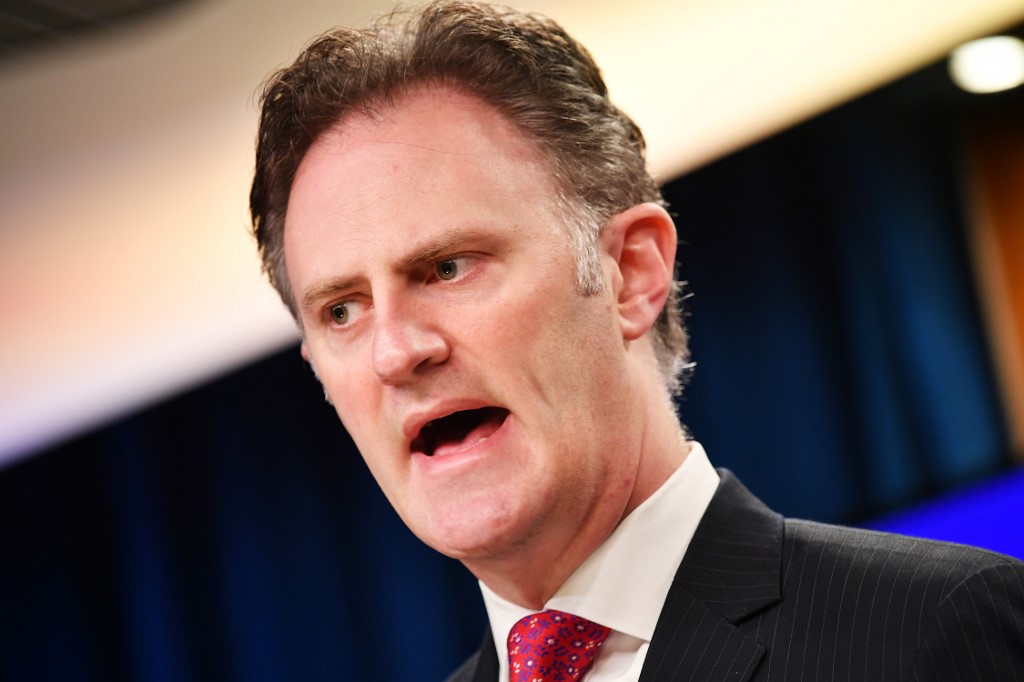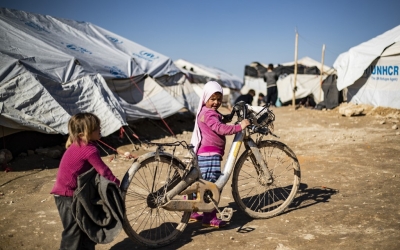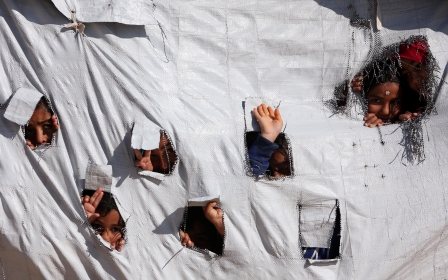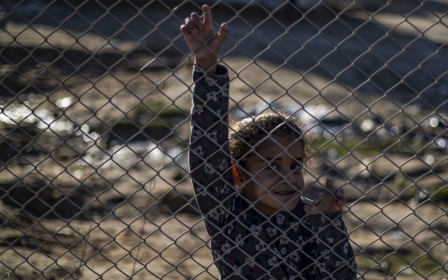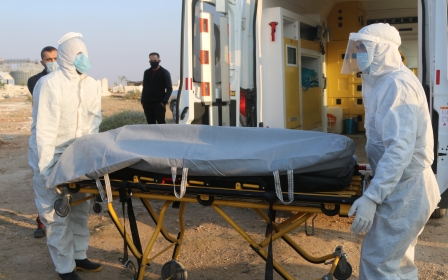US offers to repatriate foreign nationals held in northeastern Syria
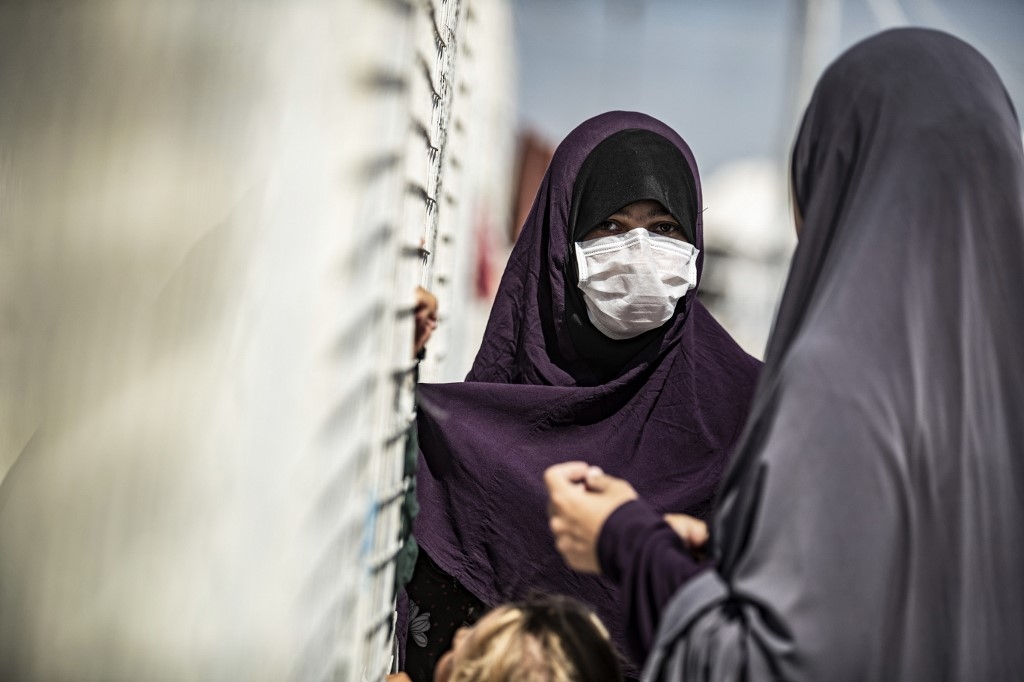
The United States is ready to repatriate foreign nationals being held by Kurdish forces in camps and prisons in northeastern Syria, a senior State Department official said on Tuesday.
Nathan Sales, coordinator for counterterrorism within the State Department, said that repatriating thousands of suspected Islamic State (IS)-linked militants and their families to their countries of origin was the only way forward.
He said the US was “leading by example” and had already assisted several countries to repatriate their citizens from the region. He went on to criticise western countries, which have mostly rejected calls to repatriate their own nationals.
'Frankly we need to see more countries step up and that includes some of the US's closest traditional allies'
- Nathan Sales, US State Department
“Frankly we need to see more countries step up and that includes some of the US's closest traditional allies,” Sales told the Global Security Forum, an event organised by the Soufan Center security think-tank.
“The US has assisted a number of countries around the world with repatriating their citizens and that is a standing offer. We are ready to assist any country that wants to move forward. Give us a call and we'll find a way to make it work.”
New MEE newsletter: Jerusalem Dispatch
Sign up to get the latest insights and analysis on Israel-Palestine, alongside Turkey Unpacked and other MEE newsletters
Sales said he could not reveal which countries the US had helped for operational reasons, but singled out Italy for praise. In September, Italy repatriated a woman and her four children who had been held in the al-Hol camp in Syria. The woman was subsequently arrested and charged.
Sales said: “We commend our Italian allies for their leadership in Europe.”
Sales' remarks suggest that the US is growing increasingly impatient with the failure of countries including the UK, Canada, Germany, France, Belgium and Australia to take responsibility for their own citizens.
His comments come after the US's top soldier in the Middle East said in August that the US military was ready to repatriate detainees anywhere in the world.
Repatriation from Syria: A country-by-country breakdown
+ Show - HideMost Western governments have refused to repatriate their nationals on the grounds that they do not have consular services in Syria and citing security concerns. Some have called for foreign nationals accused of links to IS to be tried locally.
Campaigners say governments are not being candid about the extent of their contacts with Kurdish authorities. They point to the ad hoc repatriation of orphans, the presence on the ground of NGOs and journalists, and visits to the region by Western envoys as proof that they have the capacity - but not the political will - to bring their nationals home.
Some countries have said they will take children but nor adult detainees. Kurdish authorities have refused these requests and campaigners say that separating children from their primary carers would breach their human rights. Some children have been repatriated with their mother's consent.
The following figures are estimates based on official figures, data provided by campaign groups and MEE's own research.
Australia: Eight orphans repatriated in June 2019. About 20 women and 48 children remain in the camps, and 12 men in prisons.
Belgium: Six orphans repatriated in June 2019. Six women and 10 children repatriated in July 2021. Up to 15 men, six women, and 7 children still detained.
Canada: One orphan repatriated in October 2020. Eight men, 13 women, 26 children still detained
Denmark: Two orphans repatriated. 12 Danish nationals and 30 children still detained. Dual nationals in Syria stripped of Danish citizenship
France: 28 children repatriated. About 450 French nationals, including about 270 children, still detained. Several French citizens sent to Iraq and sentenced to death.
Germany: Four children repatriated in August 2019, and a mother and three children repatriated in November 2019. About 50 men, 50 women and 150 children still detained
Netherlands: Two orphans repatriated. Dutch Supreme Court ruled in June that government is not obliged to repatriate 23 women and 56 children still detained. At least 13 Dutch men also detained
Sweden: Seven orphaned siblings repatriated in May 2019. About 40 adults and 50 children still detained
UK: At least four children repatriated. About 26 men and women and 60 children still detained. Many dual nationals in Syria stripped of British citizenship
US: Washington has called for the repatriation of all foreign nationals and has offered to help countries to take back their own citizens. All 27 Americans known to have been in Kurdish custody have been repatriated
“I'm happy to provide the resources to move them when we are directed to do that, and I can move them anywhere in the world very quickly and in a safe and transparent manner,” said US Central Command chief General Kenneth F McKenzie.
More than 65,000 people, mostly from Syria and Iraq, are currently being held in the main al-Hol camp for displaced people and families of suspected IS fighters and the smaller al-Roj camp, which are administered by the Kurdish Autonomous Administration of North and East Syria, also known as Rojava.
Roughly 3,000 women and 7,000 children in the camps are foreign nationals, while around 2,000 foreign men are detained in prisons among suspected IS fighters, according to Kurdish officials.
The governments of several western countries are facing legal action brought by the families of some of those being held in the camps, with the European Court of Human Rights currently considering a case brought by the parents of a French woman being held with her young children.
Family support groups and campaigners say that the detainees are being held in conditions that violate their human rights.
Last month, family support groups in several countries announced the creation of a network, Families for Repatriation International, to put pressure on governments to take action.
"Refusal to repatriate their own citizens cannot be the solution for any government who prides itself in defending human rights," the network said in a statement.
Middle East Eye delivers independent and unrivalled coverage and analysis of the Middle East, North Africa and beyond. To learn more about republishing this content and the associated fees, please fill out this form. More about MEE can be found here.


